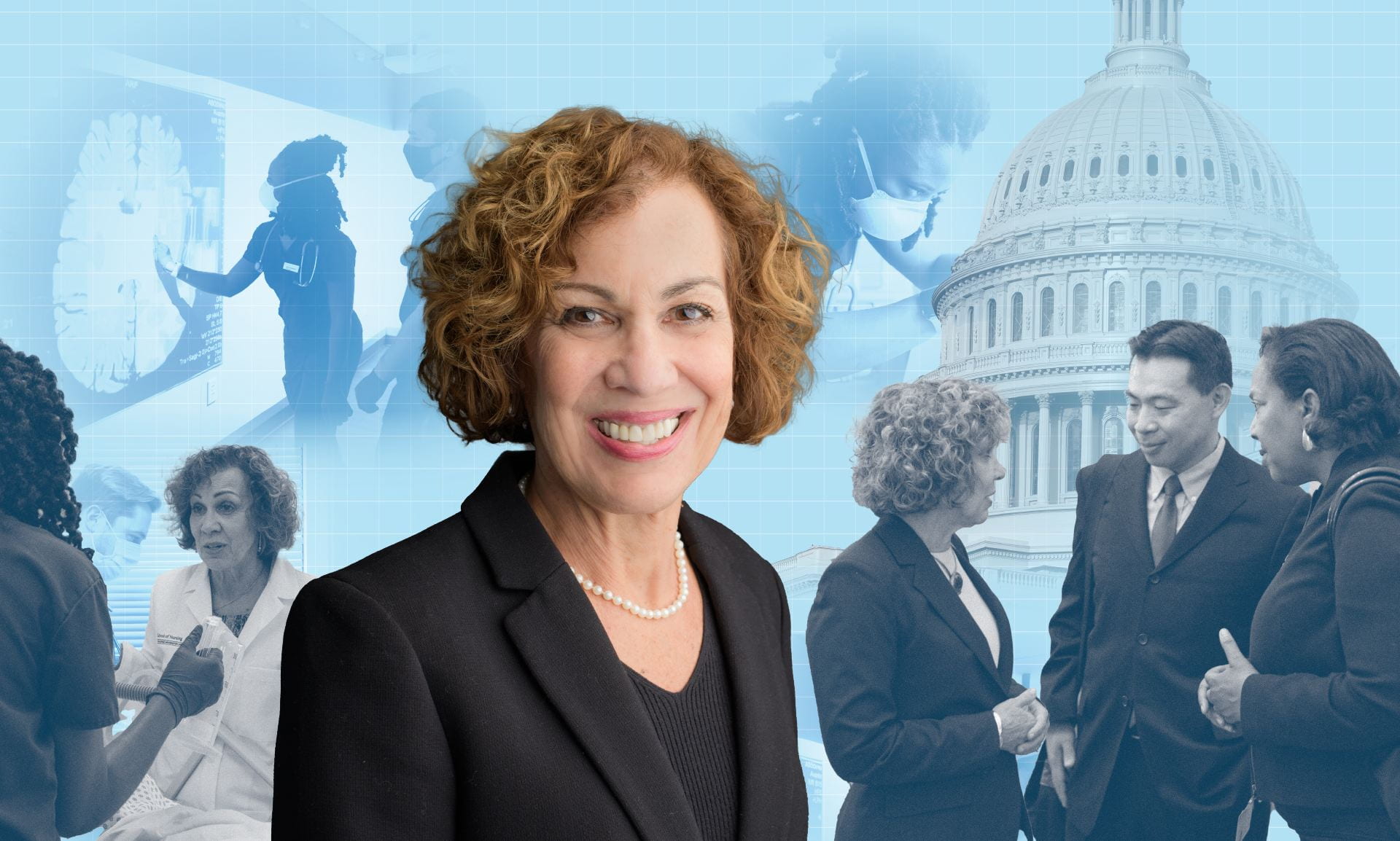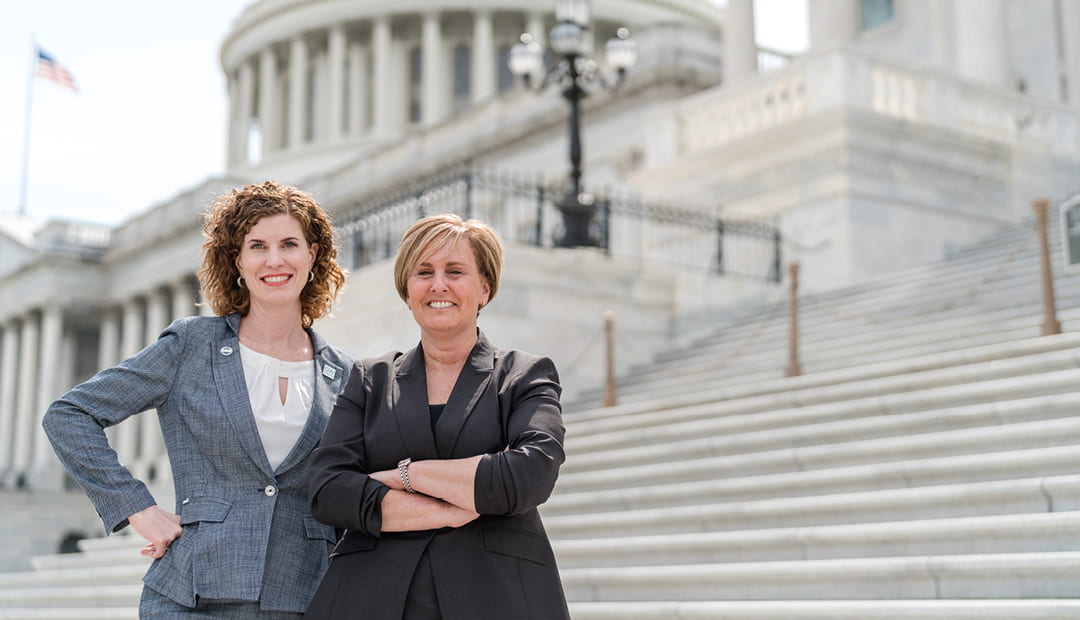The Innovation
While the COVID-19 pandemic has devastated the world in many ways, it has also fueled innovation and inspired resilience among many sectors of society. One of the many ways our GW Nursing community has been adaptive is through enhanced teaching methods, a prime example being the policy course, NURS 6205 – Health Policy, Quality, and Political Process. This course is designed to orient both master’s and undergraduate students to the policy environment, connect the dots between policy and health care quality, introduce the political process, and encourage students to be advocates.
In years past, one of the major assignments was for each student to contact their federal or state representative and dialogue with them about a specific policy issue. However, in the summer of 2020, COVID-19 had thrown Capitol Hill into chaos and the demands of legislating at that time were all consuming for members of Congress and Hill staff. Realizing this, one of the course professors, Ellen Kurtzman, created an alternative way to enhance students’ education while not inundating Hill staff with calls. Students were given options to either proceed with having a dialogue with a representative, join a virtual lobby day, or engage with a Hill staffer in a virtual Q&A session.
Q&A with a Hill Staffer
Dr. Ellen Kurtzman, Ph.D., MPH, RN, FAAN, a former Robert Wood Johnson Foundation (RWJF) Fellow, used her contacts to recruit guest lecturers from Congressional offices. This provided students with the opportunity to interact with someone working on Capitol Hill while being sensitive to the dramatic political climate. Dr. Kurtzman said that the experience was both useful and inspiring because each staffer who chose to give these lectures and talk to students, did so out of a passion for inspiring nurses to be engaged in policy.
This option, which many students chose, provided an opportunity to learn why each staffer picked this career and what, in their backgrounds and experience, led them to Capitol Hill. They were able to dialogue with students about the most pressing issues in Congress (the 116th), how to be an effective advocate, and how to best interact with a lawmaker.
When asked about the decision to host these Q&A sessions, and what that experience was like, Dr. Kurtzman explained that the staffers who spoke were policy generalists and their job depends on constituents coming to tell them what is important to their stakeholder group or using their expertise to help them interpret a bill. Dr. Kurtzman summed up the message to students as “we can’t do our job without you, so coming to visit shouldn’t be intimidating.”
With regard to the interview sessions, Dr. Joyce Pulcini, Ph.D., RN, PNP-BC, FAAN – the course coordinator – stated that the helpfulness lies in getting instructions and encouragement directly from staffers; helping students to “break the fear” of talking to legislators. She said that based on student feedback, this assignment gave them a sense of what advocacy is – that the term finally began to “become real and come alive for them.” Dr. Kurtzman agreed by saying that these extra training sessions are an important piece of the training puzzle if we are to expect students to advocate or approach their representatives on their own.
In the spring 2021 semester, Dr. Melissa Batchelor, Ph.D., RN-BC, FNP-BC, FGSA, FAAN, a former Health and Aging Policy Fellow, set up the interview session with Hill staffers. Dr. Pulcini noted how unique and extremely helpful it is to have multiple faculty members “who have worked on the Hill and know the players.”
Lobby Day
The lobby days, the other option provided, were also very successful with the students. Virginia hosted a virtual lobby day this semester, free and specific to students, that they were encouraged to attend. Maryland hosted a similar virtual lobby day option, too. Dr. Pulcini noted that these virtual sessions are another COVID-19 related innovation – stemming from necessity – but have allowed for much higher participation rates, including among our students, who might not have otherwise traveled to the state capitals to participate.
This past year has been a crucial and dynamic time for nursing legislation, particularly at the state levels. For one, scope of practice laws are finally changing in many states like Virginia because of COVID-19. Between this and the fact that most nurses will end up conducting state level (rather than federal) political advocacy, these opportunities for students to get state lobbying experience has been invaluable.
Dr. Pulcini said that these virtual options will become a regular part of the course because they provide expanded opportunities and meaningful interaction for our students.
Why this is unique and innovative
GW Nursing is uniquely situated with the right environment, context, and connections to allow for this type of innovative educational experience to exist. This “Only at GW” opportunity enables students to learn from Hill staffers and begin to immerse themselves in the legislative process.
Dr. Kurtzman credits her time as a Robert Wood Johnson Fellow with her ability to bring this opportunity to students. Her goal during her fellowship was to absorb as much as she could and translate and disseminate the lessons learned into her classroom teaching. She is proud to have been able to enhance the experience of her students and leverage her year on the Hill to inform her teaching.
Gregg Margolis, Director of the RWJF Health Policy Fellows Program, said that this innovation is a great example of how he hopes and expects alumni, like Dr. Kurtzman, to share their experience once they return to their teaching positions. He said that because many policy makers “lack the perspective of frontline providers,” it is “important for students and clinical workers to engage with them.” He added that it is equally important that they learn how to do it effectively, though.
The student perspective
One of our former nursing students, Mehdi Rahmati, now a cardiac nurse at GW Hospital, took this course with Dr. Kurtzman in the summer semester and attended the Q&A session with legislative correspondent, Shivani Pampati. About this experience, Mehdi said:
“It allowed us to learn and know how legislatures would like to connect with healthcare workers and what avenues are more effective. The interaction [of hearing from and speaking with the Hill staffer] also helped break down the walls of pessimism and hesitation that some of us had in contacting a senator. Knowing that not only can our voice be heard, but that we, as healthcare providers, can serve as a resource to the legislatures was eye opening.”
When asked how his time at GW Nursing as a whole influenced his understanding of policy, he said that he now has an appreciation for how policy is woven into everything and how important it is to nursing…
“… especially during the current pandemic. In this course, we were discussing policies every class, but I appreciated the discourse with other professors and the administration about the importance of healthcare policies and their impact on nursing. How, for instance, the government drafted policies to fight the pandemic that directly impacted nurses and healthcare workers. We learned that now, more than ever, we as nurses should take great interest in policy work, otherwise policies will be drafted without our input, and those policies will directly change our day-to-day work at the hospitals, nursing homes, clinics, and elsewhere. “
**A special thank you to NURS 6205’s guest speakers from the Hill: Shivani Pampati (legislative correspondent), McKenzie Fields (legislative aide), Alexander Urry (policy advisor), and Samantha Koehler (policy aide).
AUTHOR Haley Stepp

